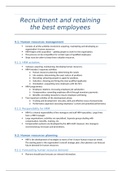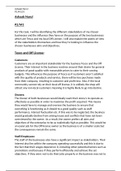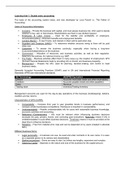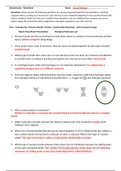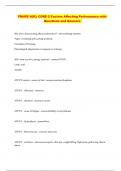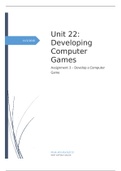SOURCES OF SOUTH AFRICAN LAW
Sources of law are the places where law originates and where it can be found.
As far as sources of SA law are concerned, it is important to realise from the outset
that we have an uncodified legal system.
This means that there is not only one primary source where the law originates and
can be found
SA law has more than one source:
The Constitution.
Legislation (statutes).
Precedent (court decisions).
Common law.
Customary law.
Works of modern authors.
foreign law.
international law.
The sources provide key content of the law because it is in those sources that one
finds the law and gets to know it. Not all sources of our law have the same
authority:
Some have binding authority (primary sources – because that is where the
law originates)
Others have persuasive authority (secondary sources – they provide us with
help to understand the primary sources)
Primary Sources of Law:
The actual law in the form of constitutions, court cases, statutes, and administrative rules
and regulations.
Secondary Sources of Law:
Restating the law, while also discussing, analysing, describing, explaining, or critiquing it as
well.
They are used to help locate primary sources of law, define legal words and phrases, or
help in legal research.
Why are Secondary Sources of Law Important? :
The first step in legal research.
They are books and other sources that assist the researcher in first, explaining and
understanding the law and second, locating the law.
They provide a good overview of the law and the text or footnotes can refer to relevant
legislation or case law.
, Constitution
Constitution as a source
In the past the Constitution was a source of law in the same way as any other
statute. Every statute regulates a specific matter. The Constitution regulated the
organisation and structure of the state. However, it influenced the lives of everyone
in that it denied the franchise to the majority of the population. It did not provide
any general norms or standards with which the whole body of law had to comply
As we noted under our discussion of the history of SA law, the Constitution of the
Republic of SA Act 200 of 1993 ushered in a new, democratic legal order. This
constitution is Sometimes referred to as the Interim Constitution.
Required a constitutional assembly to draft and pass a so-called final Constitution
that had to reflect certain basic principles
It was originally passed as the Constitution of RSA Act 108 of 1996
However, Parliament realised that it was not an ‘ordinary’ source of SA law and the
Act number and year to its name.
According to the Citations of Constitutional Laws Act 5 of 2005, the proper citation
is Constitution of the Republic of South Africa, 1996
Key characteristics of the Constitution
The 1996 Constitution symbolises a break from previous
constitutions in that it declares itself to be the supreme law of SA
The Constitution is a primary source in that it is binding and
authoritative
It also regulates the structure of state and divides the power
between three branches of government: the executive (that
enforces the law); the legislature (that creates law); and the
judiciary (applies, interprets, and develops the law) – separation
of powers
It includes a Bill of Rights
Sources of law are the places where law originates and where it can be found.
As far as sources of SA law are concerned, it is important to realise from the outset
that we have an uncodified legal system.
This means that there is not only one primary source where the law originates and
can be found
SA law has more than one source:
The Constitution.
Legislation (statutes).
Precedent (court decisions).
Common law.
Customary law.
Works of modern authors.
foreign law.
international law.
The sources provide key content of the law because it is in those sources that one
finds the law and gets to know it. Not all sources of our law have the same
authority:
Some have binding authority (primary sources – because that is where the
law originates)
Others have persuasive authority (secondary sources – they provide us with
help to understand the primary sources)
Primary Sources of Law:
The actual law in the form of constitutions, court cases, statutes, and administrative rules
and regulations.
Secondary Sources of Law:
Restating the law, while also discussing, analysing, describing, explaining, or critiquing it as
well.
They are used to help locate primary sources of law, define legal words and phrases, or
help in legal research.
Why are Secondary Sources of Law Important? :
The first step in legal research.
They are books and other sources that assist the researcher in first, explaining and
understanding the law and second, locating the law.
They provide a good overview of the law and the text or footnotes can refer to relevant
legislation or case law.
, Constitution
Constitution as a source
In the past the Constitution was a source of law in the same way as any other
statute. Every statute regulates a specific matter. The Constitution regulated the
organisation and structure of the state. However, it influenced the lives of everyone
in that it denied the franchise to the majority of the population. It did not provide
any general norms or standards with which the whole body of law had to comply
As we noted under our discussion of the history of SA law, the Constitution of the
Republic of SA Act 200 of 1993 ushered in a new, democratic legal order. This
constitution is Sometimes referred to as the Interim Constitution.
Required a constitutional assembly to draft and pass a so-called final Constitution
that had to reflect certain basic principles
It was originally passed as the Constitution of RSA Act 108 of 1996
However, Parliament realised that it was not an ‘ordinary’ source of SA law and the
Act number and year to its name.
According to the Citations of Constitutional Laws Act 5 of 2005, the proper citation
is Constitution of the Republic of South Africa, 1996
Key characteristics of the Constitution
The 1996 Constitution symbolises a break from previous
constitutions in that it declares itself to be the supreme law of SA
The Constitution is a primary source in that it is binding and
authoritative
It also regulates the structure of state and divides the power
between three branches of government: the executive (that
enforces the law); the legislature (that creates law); and the
judiciary (applies, interprets, and develops the law) – separation
of powers
It includes a Bill of Rights


